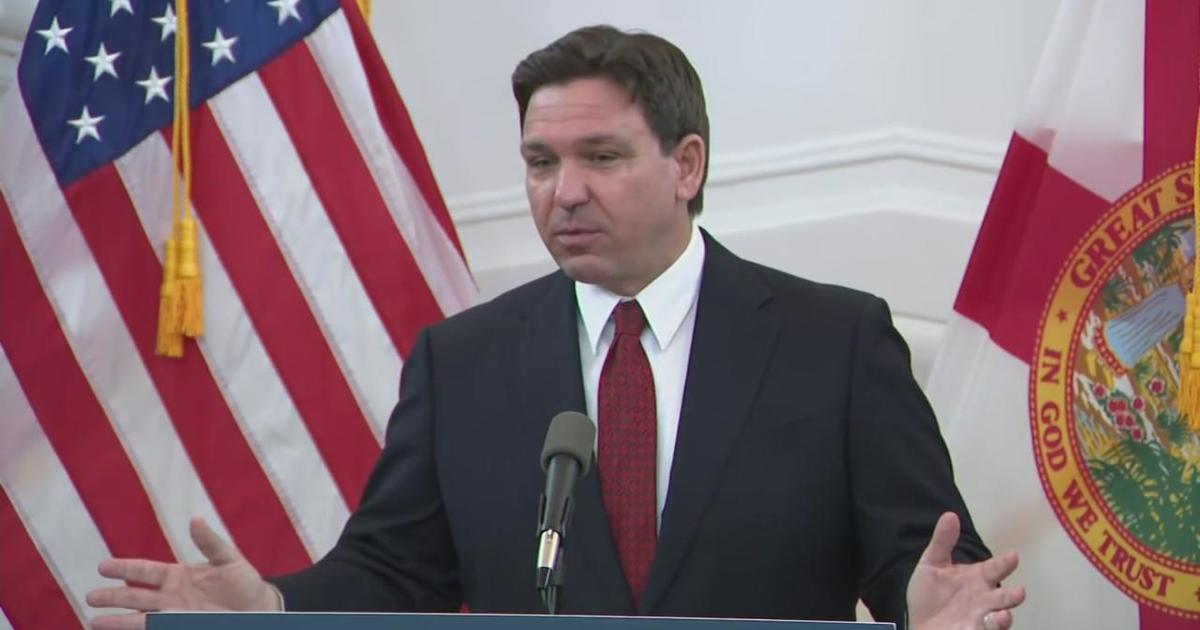Florida Gov. Ron DeSantis Signs Controversial School Vouchers Bill
TALLAHASSEE (CBSMiami/NSF) -- Saying the state is blowing up "tired old narratives," Gov. Ron DeSantis on Tuesday signed a measure designed to lead to a major expansion of school vouchers but some lawmakers and the United Teachers of Dade fiercely oppose the measure.
DeSantis, during a ceremony at St. John the Apostle Catholic School in Hialeah, said the bill (HB 7045) will help provide educational choices to families who might otherwise struggle to pay private-school tuition.
"We will be doubling down on our commitment to supporting our working families and making sure they have the ability to get their kids into schools of their choices," said DeSantis, who was flanked at the ceremony by Lt. Gov. Jeanette Nunez, lawmakers and other supporters.
The bill, passed by the Republican-controlled Legislature in April, is a large step in more than two decades of efforts by GOP leaders to offer vouchers to students. Among other things, the bill increases an income threshold to 375 percent of the federal poverty level, meaning a family of four making nearly $100,000 a year could qualify for vouchers.
Also, it strips away current restrictions, such as a requirement of previous enrollment in public schools before students can receive vouchers.
"This bill truly changes the educational landscape," Nunez said. "It increases flexibility in the programs. It also allows for parents to have access to life-altering educational choices."
But vouchers have long been one of the most-controversial issues in the state's education system, with Democrats and many public-school teachers arguing that the scholarships drain money from the public system. Also, critics argue the state should hold private schools to the same accountability standards as public schools face.
"By signing this bill into law, Gov. DeSantis is taking Floridians' hard-earned tax dollars and diverting them out of public schools into private schools without transparency or accountability to taxpayers," the Senate Democratic caucus said in a statement released shortly after DeSantis signed the measure.
United Teachers of Dade President Karla Hernandez-Mats also opposes the measure.
"Once again, our legislature continues to defund public education and gamble away our children's future at the hands of for-profit companies. This past year, our public schools have faced unprecedented challenges. Instead of focusing on funding the schools that teach over 90% of Florida's students, our legislature opted to funnel more public dollars into private and for-profit schools, many of which, like Centner Academy, fail to follow the high safety and academic standards that are required for our districts," said Hernandez-Mats in a statement on Tuesday. "Public education is the cornerstone of any functioning democracy and ensuring equitable access to high-quality funded public schools is a constitutional obligation that they are failing to fulfill. It is a shame our legislature fails to understand the value of public education and its role in supporting our children's future."
House Democrats also hammered the accountability issue during a floor debate last month.
"Funding private institutions with public funds with no requirements for certifications or regulations is hypocritical," Rep. Felicia Robinson, D-Miami Gardens, said. "This legislature should require accountability for anyone or any entity who receives taxpayer dollars."
The state has created a series of voucher programs since the 1990s, and the bill will lead to a partial restructuring of the programs.
The Gardiner Scholarship Program and the McKay Scholarship for Students with Disabilities Program --- both of which were created to serve students with disabilities --- will be consolidated into the Family Empowerment Scholarship Program, which was established in 2019 to serve a broader population of students.
DeSantis acknowledged during Tuesday's ceremony that he had not pushed for the consolidation. He said his administration would monitor how the changes affect families and students "who have unique abilities."
"If it turns out there's any hiccups in this, we will not hesitate to propose reforms in the January (2022) legislative session," DeSantis said.
As of January, the largest voucher program was the Florida Tax Credit Scholarship Program, which included about 100,000 students, according to a House staff analysis released last month. In that program, companies receive tax credits for donating money that is used to pay for vouchers.
The Family Empowerment Scholarship Program, which is more directly funded by the state, had 36,384 students as of January, the House analysis said. Currently, families can earn up to 300 percent of the federal poverty level and quality for the program --- or $79,500 for a family of four, according to the analysis.
In addition to expanding income guidelines, the bill also will boost the amount of funding attached to vouchers. Currently, vouchers are the equivalent of 95 percent of the money that a public school would receive for a student through a funding formula known as Florida Education Finance Program. That will go to 100 percent under the bill.
While critics contend voucher programs don't include enough accountability, DeSantis and other supporters argue that the key is providing choices to families. Robert Hernandez, principal of the Hialeah Catholic school where DeSantis appeared Tuesday, said 162 of the school's 190 students receive Florida Tax Credit scholarships or Family Empowerment scholarships.
"We are blowing up all these tired old narratives," DeSantis said. "We're showing that we want parents to be able to obtain quality education for their kids."
(©2021 CBS Local Media. All rights reserved. This material may not be published, broadcast, rewritten, or redistributed. The News Service of Florida's Jim Saunders and Tom Urban contributed to this report.)



